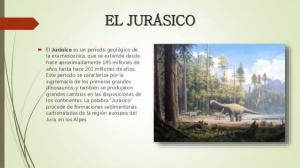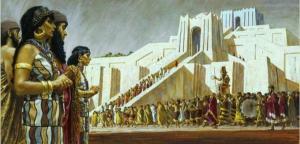What is Spanish KRAUSISM
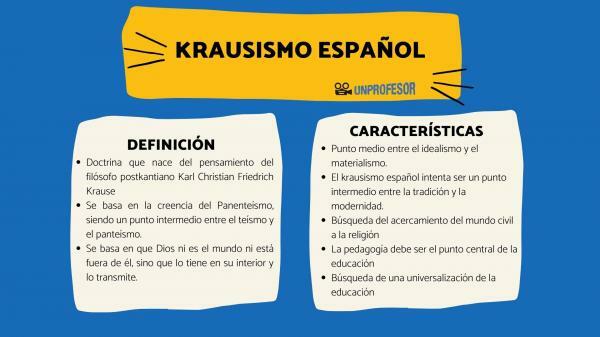
The philosophical and teaching models They are one of the elements with the greatest influence within a culture or nation, being able to cause a whole generation of students to have their own thinking that is different from other generations. To talk about what was the basis of the thinking in teaching for years in Spain in this lesson from a PROFESSOR we must talk about what is spanish krausism in a complete and detailed summary.
Index
- Definition of Krausism: Simple Explanation
- Origin of Spanish Krausism
- Characteristics of Spanish Krausism
- Representatives of Spanish Krausism in education
Definition of Krausism: Simple Explanation.
Before talking about Spanish Krausism, we must comment even briefly on the so-called Krausism, to understand what the model was based on and what were the changes it suffered when adapting to the model Spanish.
Krausism is a doctrine that arises from the thought of the post-Kantian philosopher Karl Christian Friedrich Krause
, and that is based on the Panentheism belief, being an intermediate point between theism and pantheism. It could be said that it is based on the fact that God is neither the world nor is he outside of it, but that he has it inside him and transmits it.The influence of Krausism was not the same in all regions of the world, being its area of greatest influence in the Hispanic regions, since it was Spain and the area of Latin America where the current had the greatest impact on influence. It could be said that the serious political situation in all the Hispanic regions made the appearance of a system such as Krausism necessary.
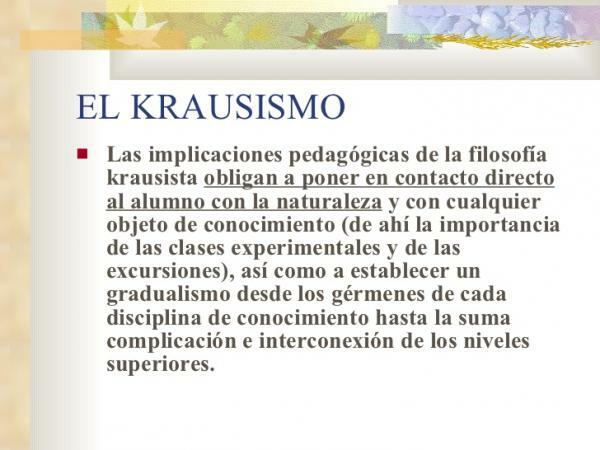
Image: Slideshare
Origin of Spanish Krausism.
The origin of Krausism in Spain has various theories, but most sources agree that the origin of this current in the Hispanic region has its beginning in 1857 when professor soriano Julián Sanz del Río he made a speech at the Central University of Madrid defending the ideas of Krausism that he had known in his travels to the German region. This being a shock for the teachers and students present at the meeting, who in most cases were unaware of this educational movement.
Although during the first months it was tried that the current of Krausism, defended by del Río and by other university thinkers, gained strength in the Spanish university study could not be so due to to rkick from high places of the University and the government of Alfonso XII, which even created the so-called Orovio Decree to prevent the university's academic freedom.
In this situation, Krausism went further, largely ignoring its philosophical content and being more of a confrontational force. in favor of academic freedom and in the decree contract.
The dispute between the university classes and the Alfonsine government against the thinkers of Krausism was a great characteristic of the following decades of Spanish education, being a confrontation that did not prevent the advance of the Spanish Krausism.
It was Spanish Krausism that gave rise to the call Free Institution of Education, being a teaching project that took place between 1876 and 1939 and that was based on using the ideas of Krausism and facing the prohibitions in education created by the Orovio Decree. It was thanks to this that Krausism became a cornerstone of Spanish education for decades.
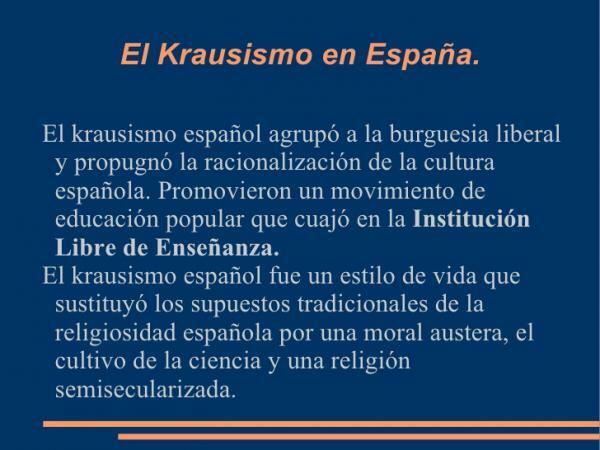
Image: Slideshare
Characteristics of Spanish Krausism.
To continue this summary of Spanish Krausism, we must talk about the main characteristics and objectives of Krausism in Spain, serving this section to understand all the elements that were key to Spanish teaching during decades. The main features of Spanish Krausism were the following:
- Krausism is a middle point between the two great doctrines Germans of the time, the so-called idealism and materialism. Spanish Krausism on the other hand tries to be an intermediate point between tradition and modernity present in Spain.
- Search for the rapprochement of the civil world to religion, being closer to a religious education than an atheist.
- He defended the existence of Law as a supreme value of a society, politics being an intermediate point between liberalism and socialism.
- Pedagogy must be the central point of educationIt is essential that the Spanish system evolve with new programs to achieve change.
- Search for a universalization of educationn, being necessary to open borders to receive cultures and educational systems from other nations.
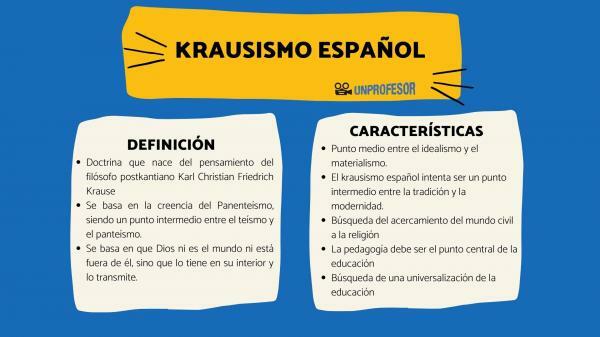
Representatives of Spanish Krausism in education.
To understand the relevance of Krausism within the Spanish system we must talk about the main representatives of this philosophical current within the educational system, to meet those people who were vital for the change in Spain. The main thinkers of Spanish Krausism were the following:
- Julián Sanz del Río: Introducer of Krausism in Spain for a speech made at the university, being responsible for a great change in the educational system of Spain and founder of Spanish Krausism.
- Gumersindo de AzcárateExpelled from the university for defending Krausism and confronting the government of the time, he was one of the founders of the Institución Libre de Enseñanza.
- Francisco Giner de los Ríos: Founder and director of the Institución Libre de Enseñanza he was the promoter of many of the education projects of Krausism, these being the antecedents of the so-called Pedagogical Missions.
- Manuel Bartolomé Cossío: Successor of Francisco Giner de los Ríos was the creator of the Pedagogical Missions and a firm defender of Spanish Krausism.

Image: Slideshare
If you want to read more articles similar to What is Spanish Krausism - summary, we recommend that you enter our category of Story.
Bibliography
Posada, A. (1981). Brief history of Spanish Krausism. Oviedo University.
- Buezas, J. L. C. (1978). Lights and shadows of Spanish Krausism. The Basilisk: Journal of Philosophical Materialism, (3), 56-64.
- Gómez-Martínez, J. L. (1983). Galdós and Spanish Krausism. New Journal of Hispanic Philology, 32 (1), 55-79.

